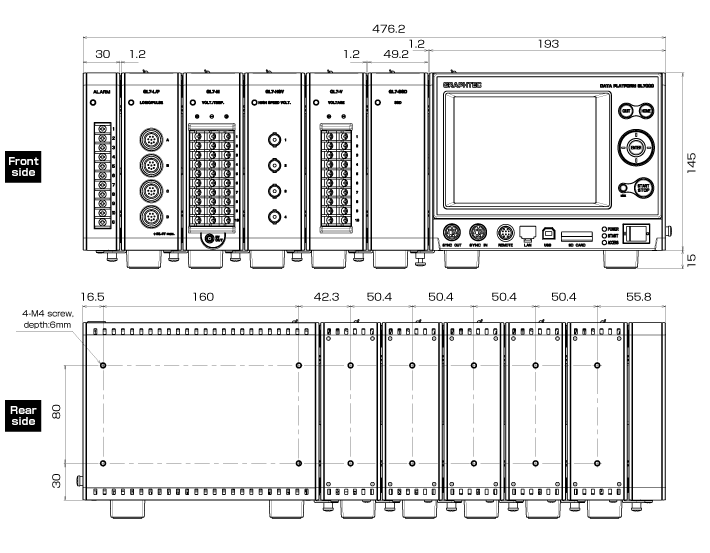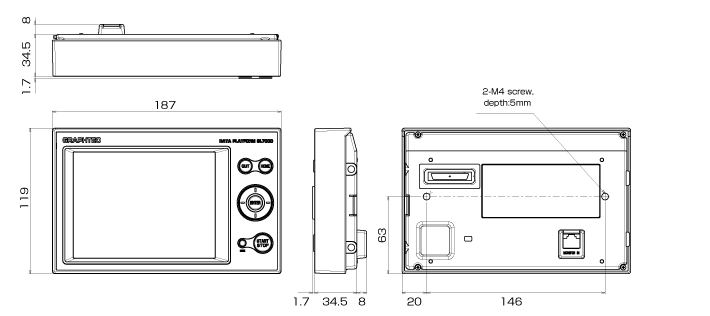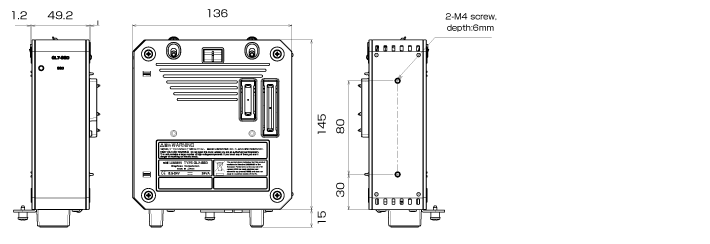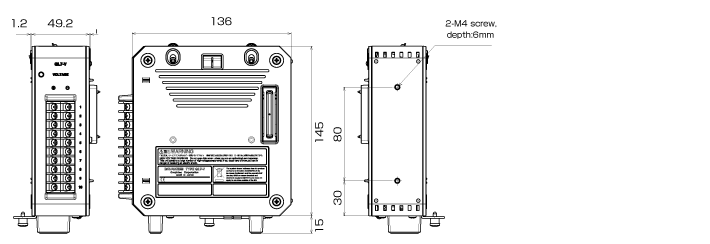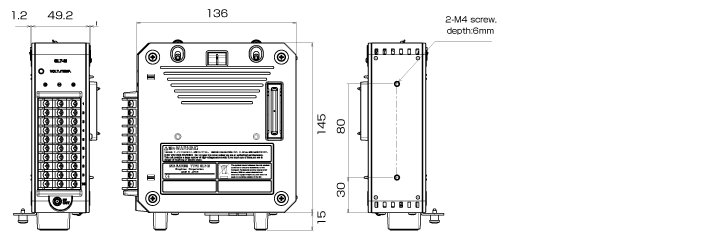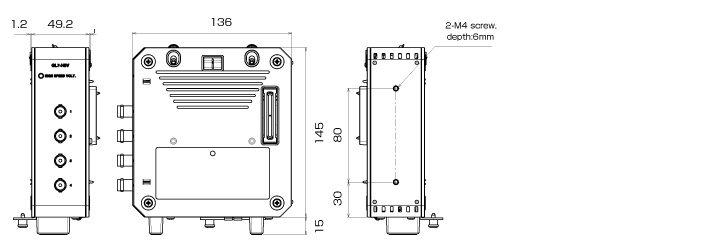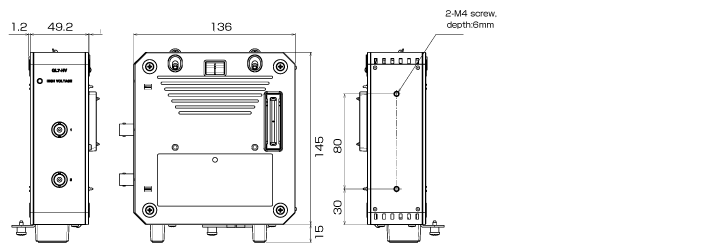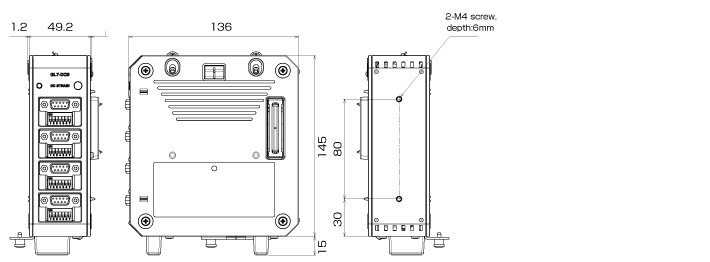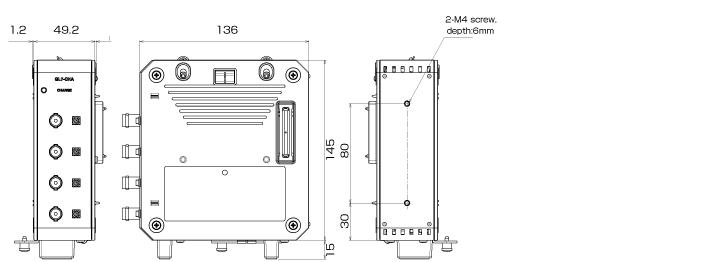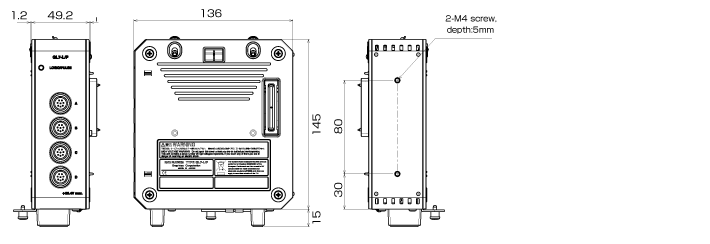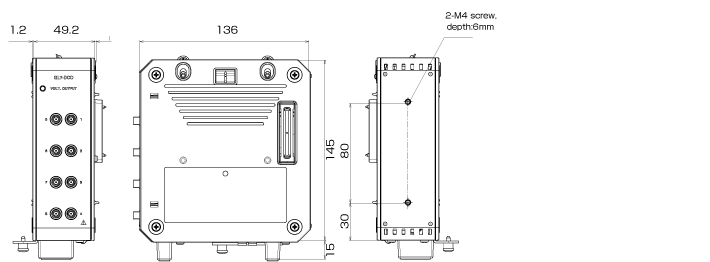GL7000 DATA PLATFORM
Main | Features | Modules | Software | Specifications | Accessories | Support & Download
SPECIFICATIONS
GL7000 - Software Specifications >>
GL7000 - Display Module Specification >>
GL7000 - SSD Module Specification >>
GL7000 - Battery monitoring test solution in pdf (382 KB) >>
SIZES
GL7000 - Main Module with 10-input / Output Modules and SSD Module >>
GL7000 - SSD Module (GL7-SSD) >>
GL7000 - Voltage Module (GL7-V) >>
GL7000 - Voltage/Temperature Module (GL7-M) >>
GL7000 - Hi-Speed Voltage Module (GL7-HSV) >>
GL7000 - High Voltage Module (GL7-HV) >>
GL7000 - DC Strain Module (GL7-DCB) >>
GL7000 - Charge Module (GL7-CHA) >>
GL7000 - SPECIFICATIONS
| Item | Description | |
|---|---|---|
| Model number | GL7000 | |
| Number of module | Attached to up to 10 modules (*1) | |
| Number of input channels | Max. 112 channels in 1 of GL7000 | |
| External Input/Output signals (*2) | Input | Start/Stop, External trigger, External sampling, Auto balance (*3) Signal type: Contact (relay), Open collector, Voltage |
| Output | Trigger, Busy (*3), Alarm (10 channels) (*4) Signal type: Open collector (pulled-up by resistor 10 kΩ) |
|
| Trigger, Alarm function | Trigger action | Start or stop capturing data by the trigger |
| Trigger repeat | Enabled (ON): Automatically re-armed for the next data capture function Disabled (OFF): Data capture is completed in a single trigger |
|
| Trigger source | Start: Off, Measured signal, Alarm, External signal, Clock, Week or Time Stop: Off, Measured signal, Alarm, External signal, Clock, Week or Time |
|
| Trigger determination conditions for measured signal | Combination: OR or AND condition at the level of signal or edge of signal Analog: Higher/Rising, Lower/Falling, Window-in, Window-out Logic (*5): Higher/Rising, Lower/Falling Pulse (*5): Higher/Rising, Lower/Falling, Window-in, Window-out |
|
| Alarm determination condition (*6) | Combination: OR or AND condition at the level of signal or edge of signal Analog: Higher/Rising, Lower/Falling, Window-in, Window-out Logic (*5): Higher/Rising, Lower/Falling Pulse (*5): Higher/Rising, Lower/Falling, Window-in, Window-out |
|
| Alarm output | 10 channels | |
| Pre-trigger (*7) | Number of data before trigger: Up to specified number of captured data | |
| Calculation function | Between channels | Addition, Subtraction, Multiplication and Division for two analog inputs (Sampling speed is limited up to 10 Samples/s (100 ms interval). Available arithmetic element and the output destination is the analog input channel 1 to 100.) |
| Statistical | Select two calculations from Average, Peak, Max., Min. in real time and replay (*8) | |
| Move function of the display range | Beginning, center or end of the data, Trigger point, Specific time (absolute, relative), Call cursor | |
| Search function | Search for analog signal levels, logic signal pattern, pulse signal levels or alarm point in captured data | |
| Annotation function | Comment can be set in each channel (up to 31 alphanumeric characters) | |
| Message / Marker Functions | Message: The registered messages or entered message is able to be recorded for any timing. Up to 8 messages can be pre-registered. Marker: Marker is able to record for occurring alarm or power failure. |
|
| Resume | Resume automatically in the same condition after power is recovered as when the power failure occurred during data capture (*9) | |
| FFT analysis function (Firmware ver. 1.20 or later) |
Analyzing frequency range | 0.08, 0.2, 0.4, 0.8, 1.6, 2, 3.2, 4, 8, 20, 40, 80, 200, 400, 800 Hz, 2, 4, 8, 20, 40, 80, 200, 400 kHz |
| Number of points | 500, 1000, 2000, 4000, 10000 | |
| Window function | Rectangular, Hanning, Hamming, Blackman, Flat-top, Exponential | |
| Averaging | Summation average, Exponential average, Peak hold | |
| Channels | 4 channels | |
| Functions | Y-T, Linear, Power, PSD, Cross, Transfer function, Coherence, COP | |
| Display mode | Single display, Dual display, Nyquist | |
| Interface to PC | Ethernet (10 BASE-T/100 BASE-TX), USB 2.0 (High speed) | |
| Network function | WEB server, FTP server, FTP client, NTP client, DHCP client | |
| USB drive mode | Emulate the USB memory device (*10) | |
| Storage device | Built-in | RAM (2 million samples, built-in amplifier module), Flash memory (2 GB, built-in the main module) |
| External (*11) | SD card (Support SDHC, up to 32GB) slot, SSD (Approx. 128GB) The file for capturing data is limited up to 2GB. |
|
| Data saving function | Captured data (*11) | Built-in RAM, Built-in Flash, SD memory card, SSD (Data is saved directly to it.) |
| Data in built-in RAM | Specified number of data up 2 million samples in increments of 1 | |
| Auto save (*11) | Available for the built-in RAM Enabled (ON): Data in the RAM is saved automatically to the built-in Flash, SD memory card, SSD Disabled (OFF): Data in the RAM is not maintained after power is turned off |
|
| Capturing mode (*11) | Mode: Off, Normal, Ring, Relay Ring (*12): Saved most recent data (Number of capturing data: 1000 to 2000000 points, Destination of data: Built-in RAM, Built-in Flash, SD memory card, SSD) Relay (*13): Saved data to multiple file without losing data until capturing data is stopped (Destination of data: Built-in Flash, SD memory card, SSD) |
|
| During data capture (*15) | Displaying information in two windows, Hot-swapping the SD memory card, Saving data in between cursors. | |
| Backup (*11) | Backup interval: Off, 1, 2, 6, 12, 24 hrs. Data destination: SD memory card, SSD, FTP server Data destination for backup cannot be specified to the same storage for destination of capturing data. |
|
| Engineering Scale function | Measured value can be converted to the engineering unit Analog voltage: Converts by four reference points (gain, offset) Temperature: Converts by two reference points (offset) Pulse count: Converts by two reference points (gain) |
|
| Synchronization between units | Start and Trigger (*14) | |
| Accuracy of clock (at 23°C) | ±0.002% (Monthly deviation approx. 50 sec.) | |
| Operating environment | 0 to 45°C, 5 to 85% RH (non condensed) | |
| Power source | 100 to 240 V AC, 50 to 60Hz | |
| Power consumption | 140VA | |
| Standard accessories | Quick guide, CD-ROM, AC power cable | |
| External dimensions (W x D x H) | Main module: Approx. 193 x 141 x 160 mm (Excluding Projection), Alarm output terminal: Approx. 30 x 136 x 145 mm (Excluding projection) |
|
| Weight | Main module: Approx. 2.2 kg, Alarm output terminal: Approx. 350 g | |
| Warranty | 3-Yr Standard Warranty | |
Graphtec GL7000 Pelican Case SKU#B-536US-7000
*1. Excluding the function module as the Display module or SSD module. In case of the DC Strain module (GL7-DCB): up to 8 modules. In case of the Logic/Pulse module (GL7-L/P): input mode is selected in the logic or pulse for each module, up to 7 modules when the module is used in the logic mode, up to 2 modules when the module is used in the pulse mode.
*2. The Input/Output cable (B-513) is required for connecting the signal. The Auto balance signal input and the Busy signal output are available in the DC Strain module (GL7-DCB).
*3. It is available on the DC strain (GL7DCB) module.
*4. The alarm signals are outputted on the terminal block attached to the main module as standard accessory.
*5. It is available on the Logic/Pulse (GL7-L/P) module.
*6. Method of detection:
Volt./Temp. module:
The alarm is detected every 5 seconds when the sampling interval is longer than 5 seconds and reported. The alarm is detected in the sampling interval when the sampling interval is shorter than 5 seconds and reported.
Other modules:
The alarm is detected every 1 ms when the sampling interval is shorter than 1ms. The alarm is detected in the sampling interval when the sampling interval is set between 2 ms to 5 seconds and reported. The alarm is detected every 5 seconds when the sampling interval is longer than 5 seconds and reported.
*7. It is available when the captured data is saved to the built-in RAM. The pre-trigger function may not available in combination with the trigger settings.
*8. The result of real time calculation is displayed in the digital display mode. Available sampling speed is the 10 samples/s (100 ms interval).
*9. When the captured data destination is set to the built-in-RAM, the captured data is not maintained after a power failure is occurred. When destination is set to the built-in Flash or the SD memory card, it may have a problem by a power failure if it is being accessed to write data. If the memory device is not damaged, the closed data file is maintained. The file is closed every minute while data is being captured. This function is not available when the FFT mode or the Voltage Output module (GL7-DCO) is used.
*10. The USB drive mode is started by setting of the switch on the main module. It can be also started when the power is turned on while pressing the START/STOP key on the display module.
*11. The SD memory card is not included as a standard accessory. Compatible SD card type: SD, SDHC Speed class 4 or faster. The SSD module (GL7-SSD) is an option.
*12. The capacity for saving the data is set to one third of available memory when the captured data destination is set to a device other than the built-in-RAM. Available sampling speed is up to 10 samples/s (100ms interval).
*13. The file size of captured data is limited up to 2 GB. When the captured data destination is set to the built-in Flash or the SD memory card, sampling speed is limited up to 100 samples/s (10 ms interval). In case of using the SSD module (GL7-SSD), sampling speed in limited up to 50 thousand samples/s (20 μs interval) when 1 or 2 modules are attached.
*14. The Sync cable (B-559) is required when this function is used. The GL-Connection software is required when the synchronizing function is used.
*15. This function is able to be available when sampling speed is set up to 10 samples/s (100 ms interval).
GL7000 - SOFTWARE SPECIFICATIONS
| Item | Description | |
|---|---|---|
| Model name | GL-Connection | |
| Supported OS | Windows 10 / 8.1/ 8/ 7/ Vista (32/64-bit edition) | |
| Functions | Control GL7000, Real-time data capture, Replay data, Data format conversion | |
| Controlled unit | Up to 10 units GL7000 only: max. 1120 channels Mixing with GL series: max. 2000 channels |
|
| GL7000 Settings control | Input settings, Memory settings, Trigger and Alarm settings, Other settings | |
| Captured data (*16) | * Built-in RAM (Binary format), Built-in Flash memory (Binary, CSV format), SD memory card (Binary, CSV format), SSD (Binary, CSV format) The sampling speed is limited by the number of channels used when data is saved in the CSV format. (1 ms per channel. When 10 channels are set, sampling is limited to 10 ms.) * When captured data is saved to the built-in RAM or SSD, data cannot be saved on the PC in real time. |
|
| Displayed information | Analog waveform, Logic waveform, Pulse waveform, Digital values | |
| Display mode | Y-T waveform with digital values, X-Y graph in real time/replay saved data (ver. 1.20 or later), FFT measurement (ver. 1.20 or later), Cursor information, Capture condition, Alarm information | |
| File operation | Converts binary data to the CSV data (specific period, all data in one file, multiple files), Creates a new file with compression or by consolidating multiple files. | |
| Warning Function | Send e-mail to the specified address when the alarms occur | |
| Statistical calculation | Capturing data: Maximum, Minimum, Peak or Average Replaying data: Maximum, Minimum, Peak, Average or RMS in between cursors |
|
| Search function | Level | Specific level in any channels |
| Alarm | Occurred alarm in any channel | |
| Time | Beginning, center, end of the data, Trigger point, Specific time (absolute, relative), Specific number | |
| Operation lock | Operation screen can be locked (It is unlocked with a password.) | |
| FFT analysis function (Firmware ver. 1.20 or later) |
Analyzing frequency range | 0.08, 0.2, 0.4, 0.8, 1.6, 2, 3.2, 4, 8, 20, 40, 80, 200, 400, 800 Hz, 2, 4, 8, 20, 40, 80, 200, 400 kHz |
| Number of points | 500, 1000, 2000, 4000, 10000 | |
| Window function | Rectangular, Hanning, Hamming, Blackman, Flat-top, Exponential | |
| Averaging | Summation average, Exponential average, Peak hold | |
| Channels | 4 channels | |
| Functions | Y-T, Linear, Power, PSD, Cross, Transfer function, Coherence, COP | |
| Display mode | Single display, Dual display, Nyquist | |
| Creating output data function (Version 1.40 or later) |
Saved data file (GBD/CSV format) in the PC, Saved data file (GBD format) in the GL7000, Generated simple waveform (DC voltage and sine, triangle, ramp, pulse waveform) * This function is available when the analog voltage output module (GL7-DCO) is attached to the GL7000. The signal is output from the GL7-DCO module. |
|
*16. When data destination is specified to the RAM or SSD on the GL7000, the captured data can not be saved on the PC in real-time. The data in the RAM or SSD on the GL7000 can be saved to the PC after the data capturing is completed.
GL7000 - DISPLAY MODULE SPECIFICATION
| Item | Description | |
|---|---|---|
| Model number | GL7-DISP | |
| Display device | 5.7-inch TFT color LCD monitor (VGA: 640 x 480 dots) | |
| Operation | Touch panel and Cursor keys (*17) | |
| Touch panel | Capacitive type touch panel, Operated by finger or the proprietary pen | |
| Displayed language | English, French, German, Chinese, Korean, Japanese | |
| Screen saver | Turns off back-light by 10, 30 sec., 1, 2, 5, 10, 30, 60 min. | |
| Displayed information | Waveform in Y-T with digital values, Waveform only, Digital value, Waveform in X-Y | |
| Connection cable | LAN cable (CAT5 class, Straight connection, Up to 10 m) (*18) | |
| Standard accessories | Bracket for slanted mount, Connection cable (40 cm), Ground cable, Screws | |
| External dimensions (W x D x H) | Approx. 187 x 34.5 x 119 mm (Excluding projection) | |
| Weight | Approx. 530 g | |
*17. Most operations can be selected by both the touch panel and the cursor keys.
*18. When the display module is mounted at an angle using the bracket, the display module is connected to the main module by a LAN cable that is attached to the display module as a standard accessory.
GL7000 - SSD MODULE SPECIFICATION
| Item | Description | |
|---|---|---|
| Model number | GL7-SSD | |
| Storage device | Solid state disk (SSD) | |
| Capacity | Approx. 128GB (The file size of the captured data is limited up to 2GB.) | |
| Sampling speed (*19)(*20) | Attached to 1 or 2 modules | Max. 1 M Sample/s (1 μs) |
| Attached to 3 or 4 modules | Max. 500 k Sample/s (2 μs) | |
| Attached to 5 to 10 modules | Max. 200 k Sample/s (5 μs) | |
| External dimensions (W x D x H) | Approx. 49 x 136 x 180 mm (Excluding projection) | |
| Weight | Approx. 770 g | |
*19. The sampling speed in the GL7000 is limited to the faster sampling speed of attached input module. When the selected sampling speed in the GL7000 is faster than the module, the sampling is done in fastest sampling on the module. The same value is stored to the memory device in the selected sampling speed until data is renewed by the next sampling.
*20. When the sampling speed in the GL7000 is selected to the 1 MS/s (1 μs) or 500 kS/s (2 μs), the number of available channels in the Logic/Pulse module will be limited.
GL7000 - MAIN MODULE
GL7000 - MAIN MODULE WITH 10-INPUT/OUTPUT MODULES AND SSD MODULE
Scale: mm Tolerance: +/- 3 mm
GL7000 - DISPLAY MODULE
Scale: mm Tolerance: +/- 3 mm







